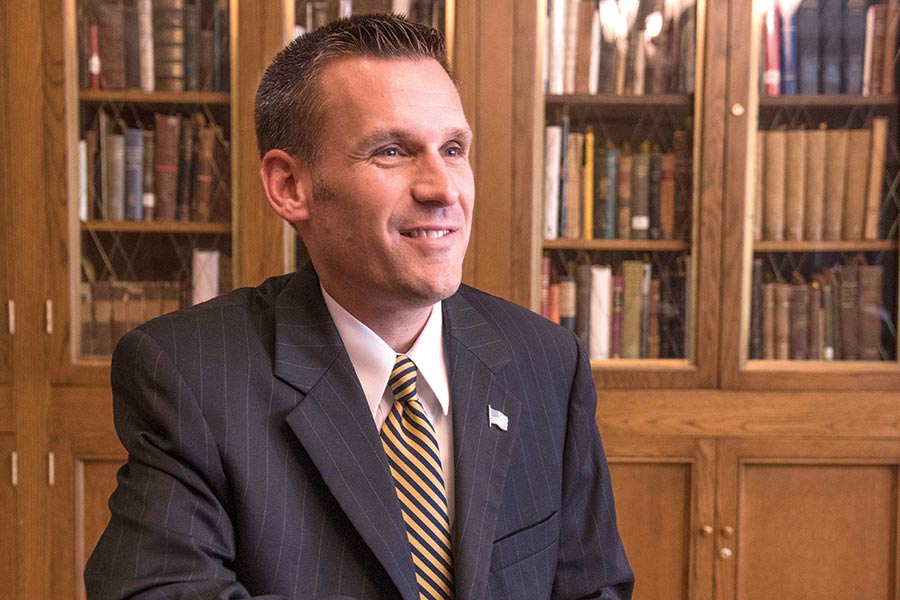THEIR LIFE'S WORK
The Job Is Justice
Gregory McCaffrey '98 dispenses justice as a district attorney in rural upstate New York.
by Julia Smith '20

“The job of a district attorney is to make sure that justice is done,” says Livingston County District Attorney Gregory J. McCaffrey '98. “It’s not about winning every case, or getting the maximum sentence possible. It’s about making sure that people’s rights are protected and that justice is done to the best we can.”
McCaffrey—a political science major with a J.D. from the University at Buffalo SUNY School of Law—began his career working in local court as an assistant district attorney with Monroe County. “My second day as a prosecutor in Monroe County I had to go to Henrietta Town Court where there were 180 cases.” He eventually worked his way up to the Major Crime Bureau and Gun Bureau, and has now served as the Livingston County D.A. for six years.
He takes the job seriously. From homicides to white collar crime, “every single felony case in my county comes to me for review,” McCaffrey says, adding that the county has 300 to 400 felonies a year. “As an elected D.A. in a small county, I actually have a heavy caseload. Major counties have 80 to 100 assistant district attorneys—I have five.” His rural county office “is a small team but we have a pretty important function. Ultimately, whatever happens good or bad, reflects most heavily on me in this office.”
McCaffrey enjoys the variety each day that his office brings. “It’s the unknown. Every case presents unique and new facts. I get the chance to work on everything: violent crimes, sex crimes, white collar crimes, traffic crimes … Fifty percent of the time I have a plan and I don’t end up doing any of it because something comes up. I’m constantly learning and doing something new. Any job you have where you want to come to work is a great job.”
That being said, McCaffrey’s responsibilities force him to cope with a more brutal side of humanity. In fact, given his county’s rural setting and small population, it is not uncommon for him to visit specific crime scenes, such as fatal car accidents or gory murders. “I recently did a trial in which a Rochester woman’s son was killed by his girlfriend,” McCaffrey says. “Even though we were successful in getting a guilty verdict, it was difficult to reassure her because the thought of her son’s killer going free when her son wasn’t coming back is emotional.”
Since beginning his career, McCaffrey has learned that it’s impossible to please everyone. “Defense attorneys aren’t usually happy with prosecutors because they have to advocate for their clients,” McCaffrey says. “The police typically want a harsher sentence or the perfect arrest, but no arrest is perfect. Victims are rarely completely happy because they might have wanted more, or quite frequently in domestic violence cases, they wanted less.” As a father, McCaffrey finds any case involving children to be particularly tough, especially when it comes to child sex cases. Under such circumstances, his successes become even more meaningful. McCaffrey has child victims “who come back years later who are graduating high school or going to law school. Any of those success stories are great.”
McCaffrey focuses on how important his work is to his community. “What I see every day is a really big deal to the person it happens to, and I keep that perspective with me every day,” he notes. “Whether someone gets a traffic ticket, or gets arrested, or is a victim of a crime—that’s probably one of the most poignant moments that will, significantly or insignificantly, impact the rest of their life.
“Every day you do what’s right, you do what’s just, and you do what’s fair. That makes the job easy.”
Julia Smith '20 is a communication and media major at Nazareth.